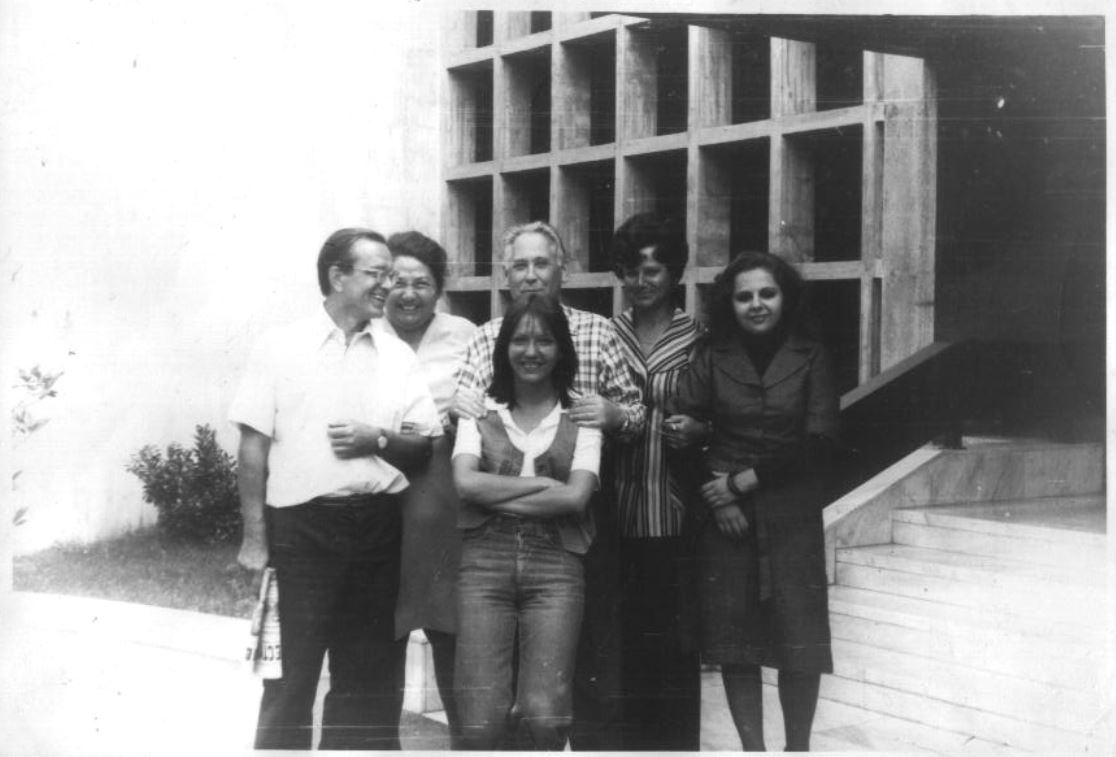
In the second part of the interview to the DataArt museum project, Vera Glushkova, a senior researcher at the Kiev Institute of Cybernetics, recalls how Soviet students lived, talks about the “Cybertonia” happening, which all Kiev went to in the 1960s, and its revival in the 1970s, about football cybernetics Valery Lobanovsky and what it means to be the daughter of a famous scientist.
In the photo Vera Glushkova (center) with her family in Bulgaria, on the left her father - Academician Viktor Glushkov. Read the first part of Vera Viktorovna's interview here .
Student weekdays
- At what point did it become clear that you would follow in your father's footsteps?
- From the very beginning. Maybe I didn't really want to, I liked foreign languages, but my parents said: "We must go there."
- So your father influenced you?
- No, he just gave advice, never forced, because he believed that a person should choose himself. But mom is the opposite.

Valentina Mikhailovna and Viktor Mikhailovich - parents of Vera Glushkova
- Where did you study after school?
- At the university at the Faculty of Cybernetics. Specialty - economic cybernetics. In addition to her, the faculty had departments of applied mathematics and mathematical linguistics.
- How did the fact that you are Glushkov's daughter affect your life? Did it help?
- Rather the opposite. My father was a member of the party, he worked with the defense industry, he received a lot of attention. There was a wiretapping on our phones in our apartment. And God forbid that my sister and I did something wrong - it would have flown in so that it didn't seem a little. One student I know recently complained to me that he was forced to do something besides his studies, whether to sweep or clean. This is perplexing for today's youth, but in our time it was in the order of things. What we just did not do: a collective farm, a construction site, a vegetable base. I caught bandits - I went to the DND (voluntary people's squad - Ed.), Washed dishes in the dining room.
Mainly girls studied economics in our country. When we moved from the old red university building to the new cybernetic one, we were often sent to do construction and cleaning work. I remember they sent us into the yard after a couple, gave us a shovel in our hands and said that we had to dig a ditch. Well, what about the girls? We got up, dug twenty centimeters and la-la-la. In half an hour our curator Fyodor Khvorostyany comes. He was small, up to my shoulder. I looked at this case from under his brows, took a shovel and literally in 15 minutes dug a ditch, which we were digging for half an hour.

The building of the Faculty of Cybernetics of Kiev State University was built in 1976-1978. Photo source: pastvu.com
Or another episode. Heating in the new building of the faculty did not work for us for a very long time. It was + 8 degrees in the building, and we passed the exam to Professor Belov, the mathematics was quite difficult. We go in, and he says: "They took off all the fur coats, because you have cribs there." They took off, wrote, chattering teeth, we come up with school books. He picks them up and says: "Until you bring a certificate from the commandant that you worked for two hours cleaning the territory, I will not return the record books."
Such were the Soviet student days. They swept the streets in front of the institute, loved to go to vegetable bases. The work is not dusty, and vegetables and fruits were allowed to be taken as much as you could take. They went to the collective farms to help. In the summer it was very good: in nature, fresh natural products, a river. But in the 1st year, I remember, we went in November. We were sent to save carrots and beetroots for two weeks. They froze, the snow fell. Because of the cold, we slept without undressing, in fur coats. In the morning we got up, went to the field and worked until the evening. If the carrots only had to be collected - the tractor was digging them out of the frozen ground, then I tried to pick out the beet with my foot. Sometimes half a bunch flew off. When they became completely dirty a week later, instead of sleeping they went home to wash at night and were already at work in the morning. Everyone was fine with this.
Remake of "Cybertonia"
- How was your training organized? Have you seen the cars?
- There was an M-220 in the building of the library, and the whole university, except for the humanities, went there to count. I am very grateful to my programming teacher Baudrik, I often remember him. The programming pair was the first on Saturday, and many students did not attend. I want to sleep, especially since in those days it was possible to miss up to 60 hours with impunity. I remember walking down the corridor of the university, Bodrik catches me and says: "Glushkova, of course, I understand that your alarm clock does not work, but if your program does not work, I will not set the test." I learned to program in Fortran.
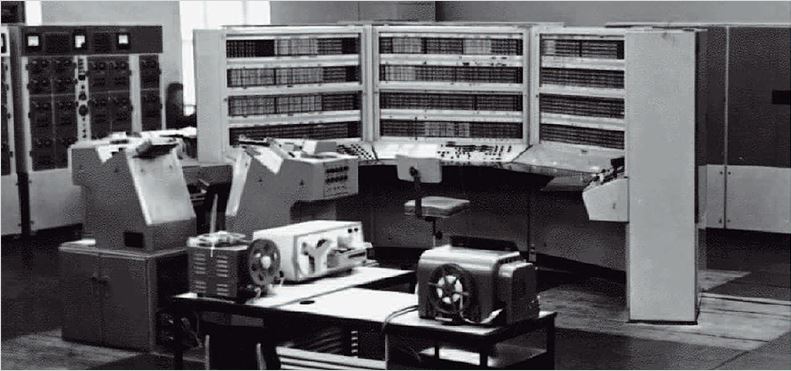
The M-220 is a semiconductor computer developed in 1968. Produced at the Moscow plant of calculating and analytical machines and the Kazan computer plant until 1974
- What was the access to the computer? As usual, did you hand over the punch cards through the window?
- We worked more on a reperforator, learned how to cut punched cards by hand. If you just give it to fill, you need to stand in a long queue at the window, and the filling process was long. Therefore, they themselves cut the holes with a razor, then put them into the reperforator, and under this one with holes - a whole punch card. She was already making her way straight. If it turns out even a little crooked, it won't read. By the end, I already knew all the codes by heart. Another secret weapon of mine was Light's friend. The queues were long, more than once a day the deck was not chased away, and Sveta had an acting talent - she could cry. She came in and from the doorway began to sob: "We will not be awarded a test if you do not skip our decks out of line." And so on three times a day.
- You didn't consider it possible to take advantage of your father's position? At least at work for him to count something, for example?
- God forbid! My father would never have done it. Everyone should do his own thing, and he had so many of them that there was no desire to ask him for something. If we did something, it was for the common good, not for my own. For example, a remake of "Cybertonia" at the University on faculty day.
The 1960s in the USSR were the heyday of various student and scientific skits. At this time, the fabulous country of Cybertonia appeared at the Kiev Institute of Cybernetics. At first it was New Year's Eve, then the tour began with humorous performances at various venues in Kiev. Institute employees performed at the Theater of the Young Spectator, in the October Palace. They were filmed by television, Ukrainian newspapers wrote about the virtual country of Cybertonia. In fact, our institute in those years was one of the intellectual drivers of the country.

Institute of Cybernetics in Kiev, 1960s. Photo source: cyberua.info
We did "Cybertonia" on the day of the faculty in the image and likeness. Preparation began a few months before the event, Olya, my older sister, went to talk with the participants of the "Cybertonia" of the 1960s. In my opinion, on the day of the faculty, May 5, the whole university did not study - everyone came running to see how the cybernetics were celebrating. We had a parade, a parody program "Time", an auction, our own money - kibas, we printed them for a whole month on punched cards with four degrees of protection. And I also made counterfeit money.
There was a lot. The pond in front of the building was given the name of Norbert Wiener, and the Loch Ness monster was supposed to emerge in it. In the basement floor there was a freak show, which exhibited things of favorite teachers, paintings, which were then played out at an auction. Once even a real horse from a nearby hippodrome was brought to the parade.
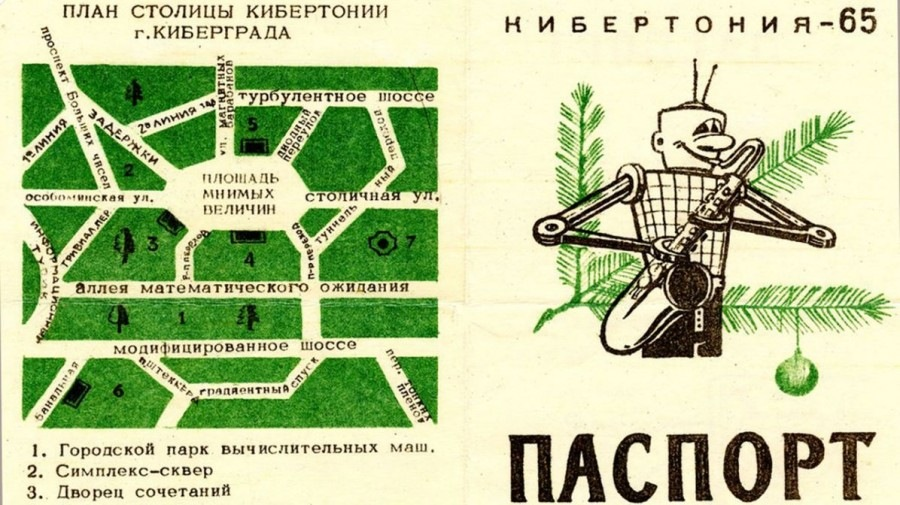
An invitation card for the New Year's Eve, made in the form of a Cybertonia passport
- They say that someone was punished for kibas - that very currency?
- Vladimir Petrovich Shevchenko, deputy dean, was summoned to the party committee: "What kind of money do you have ?!" He managed to fight back. There were events - a conference, an auction - which could only be attended by kibs. Just ordinary money changed in equivalent. There were exchange offices in the hall of the faculty, where one could also buy a souvenir for punched-card money.

Cybertonia's banknotes still occasionally surface at auctions. Photos from the auction.ru trading platform
- Everything is somehow too democratic for the 1970s – 1980s.
- Everyone who remembers says that it was an incredible time. We were doing very well with democracy. A person could come up with his idea, everyone loved to stay at work for a long time, they almost lived there. And they were friendly, there was no all-consuming pursuit of personal success. The Strugatskys have a story "Monday begins on Saturday." These moods are very well described there.
BESM-6 and the first personal
- When you first saw the computer with your own eyes, what were your feelings?
- I don't remember any particular emotions. I started going to BESM-6 when I was writing my dissertation in 1984. She graduated from the university in 81, then sat with her daughter - she was born to me after the 5th year. When I went to work, I began to consider my task. BESM-6 is a wonderful machine, it is like a personal one. You come in, work and no problem. And next to us was the EU. There - constantly shouts, drums flying off, something does not work. We didn't have that, it's a pleasure.
- Did you have video terminals?
- Yes, everyone sat at his own.
- Remember your first personal computer?
- It was "Sinclair", by the way, assembled by hand. We bought it home and played the Ghos game. "We loaded it from the cassette recorder, and the image was displayed on the TV.
- What was the first person at work?
- The first came "Neuron", our domestic. It was the 1980s. Since at first there was only one car, the whole department came to play and work on it, people stayed even at night. They loved to drive Digger, even there were championships on it. We drew pictures on Neuron, wrote music, competed to see who would make the program better. Chess, for example.
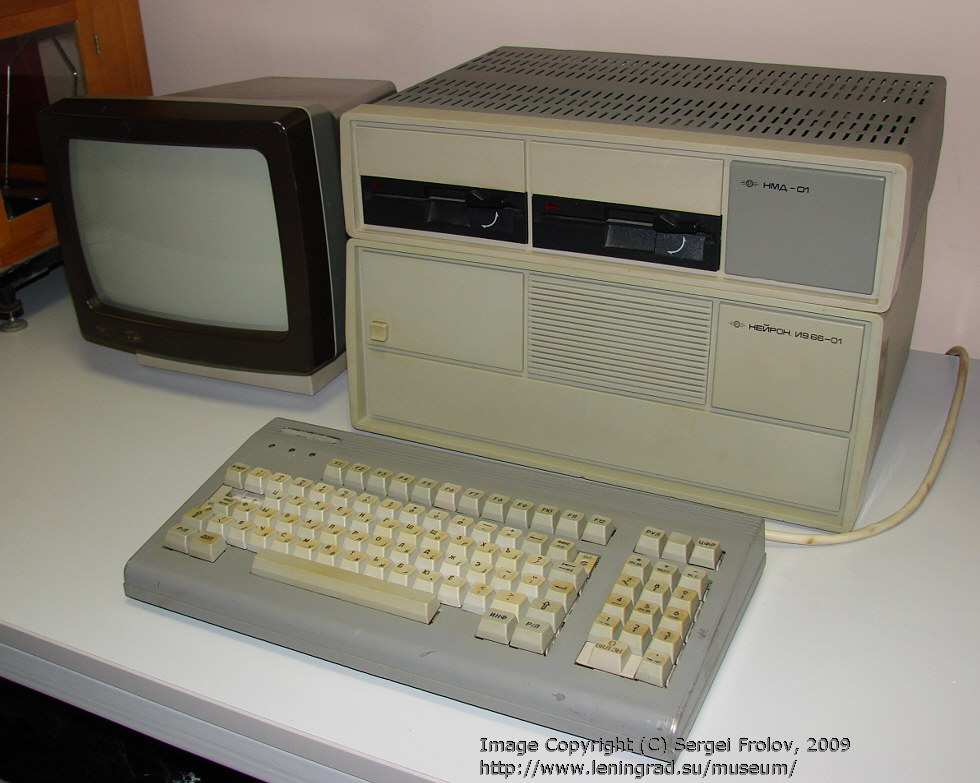
Neuron I9.66 is a Soviet IBM PC / XT-compatible personal computer. Developed at the Kiev Research Institute of Radio Measuring Equipment in the mid-1980s, produced for seven years. Photo of a PC from the collection of Sergei Frolov
Cybernetics virus
- Is the economic cybernetics, which you were engaged in, a fresh direction at that time?
- Many directions were new then. The Institute of Cybernetics had, for example, three medical departments, one of the departments of medical cybernetics was headed by Nikolai Amosov, a very famous cardiac surgeon in the USSR. He performed operations on patients with heart defect, they needed apparatus. In addition, he conducted two more topics at the institute. In particular, the topic of personality modeling.
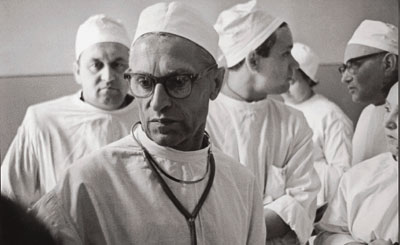
Nikolay Amosov is the author of innovative techniques in cardiology and thoracic surgery, works on the problems of gerontology, artificial intelligence and social life planning
Father, if something new appeared in the world, he immediately created a department or group, and people began to work in these areas. Sometimes the very directions for new departments were determined. There was so much of everything at the institute! The brothers Vladimir and Mikhail Dianov made very accurate calculations for Halley's comet. There were departments of chemical cybernetics and policy forecasting - now this is one of the most fashionable areas. There, the beginning of one of the Arab-Israeli crises was calculated up to the day. I remember my father rejoiced: "They predicted exactly!"
Football cybernetics is a separate story. Valery Lobanovsky, a famous trainer who had a technical education, was engaged in it. First, he studied at the Kiev Polytechnic, then, when he played in "Chernomorets", he graduated from the Polytechnic in Odessa. He was the first in the world to start calculating team play as a model. As I understand it, this was a new trend, because it was not possible to squeeze out the result by simply increasing the number of workouts. I had to invent something, and decided to solve the problem mathematically, to optimize the game as a cybernetic object.
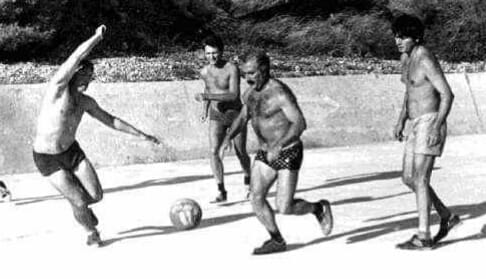
Both Viktor Glushkov himself and many of his employees loved football. In the photo in the center Naum Shor - Head of the Department of Non-Smooth Optimization of the Institute of Cybernetics
At that time, athletes from individual sports were already cheated. In our country, Petrovsky, the head of the department of the Institute of Physical Education, became the first to deal with this direction, who shortcuted Valery Borzov, an outstanding sprinter, champion of the Olympic Games. And Petrovsky, using mathematical models, brought him to the peak of his form for important competitions. By the way, he came to the conclusion that there is no need to increase the number of training sessions. You can even decrease it, there just has to be a certain rhythm. This is much more effective.
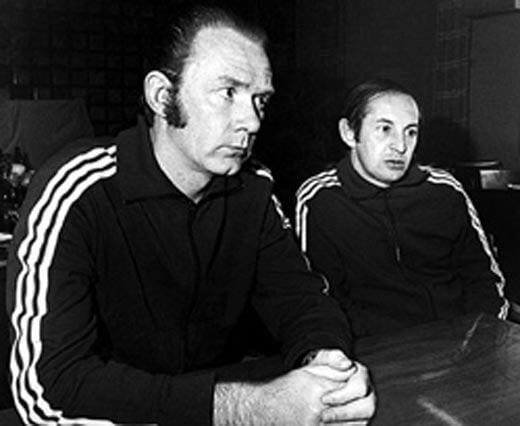
Valery Lobanovsky and Oleg Bazilevich
In 1974 Zelentsov, Bazilevich and Lobanovsky created a scientific center at Dynamo Kiev and began to calculate not only each player in order to bring him into optimal physical shape for the time of matches, but also the strategy and tactics of the game. Lobanovsky turned to Glushkov for help, they talked for five hours. I was told that my father proposed the concept of a "dynamic stereotype" related to simulated situations in football. Lobanovsky carefully studied the game of his opponents, taking into account all the subtleties. Then all this was entered into the model and calculated. One graduate student at the Institute of Cybernetics even wrote a book with Bazilevich on the application of mathematical game theory (a separate mathematical discipline) to football.
In 1974, they began to work in this direction, and in 1975 they took the UEFA Super Cup. In the 1990s, Lobanovsky wrote that “we invented football cybernetics”. My son-in-law was making the documentary Lobanovsky Forever , where Platini and other famous footballers talk a lot about his intellectual football. Foreigners came to study with him. As we noted in one article, "the cybernetics virus hovered over the city of Kiev."
Memorial room
- What was your dissertation devoted to?
- Its theme is the traveling salesman problem for moving objects. The current GPS navigators, which are in cars, are for static objects, and for the first time I set the task for dynamic ones. Optimal avoidance of moving objects. By the way, mathematicians wrote in the abstract journal that I had posed such a problem for the first time.
- When did you defend yourself, what problems did you deal with?
- In 1991, in connection with the topic of my dissertation, I was enrolled in the SDI program "Strategic Defense Initiative" - this is military space. But the Union collapsed, and space, unfortunately, was covered for us.
Later I worked on the Chernobyl issue. After the death of his father, the institute was divided into several research centers. I moved to one of them to Mark Zheleznyak. Now Mark Zheleznyak works at the University of Fukushima at the invitation of the Japanese side, and then we were dealing with Chernobyl. Three groups calculated the spread of radionuclides along the Dnieper after the Chernobyl accident: Muscovites, Leningraders and ours. Zheleznyak's group calculated the most accurate, she was the best in hydromechanics, then she was invited to various international projects. We participated in the Rhodes project, which is the development of a decision support system for eliminating the consequences of nuclear accidents in Europe. I was involved in a population evacuation program. This was done with the money of European taxpayers, and we were supervised by comrades from the European Parliament. It was already in the 1990s.
By the way, at the same time in the 1990s we in our department already started working remotely. Our team was very young, all employees worked in one machine room, where there were many staff. It was incredible noisy. Then our manager handed out personal computers to senior researchers and allowed us to work from home, sending assignments by e-mail. At home at my computer, probably half of the yard of kids was jostling.
After the crisis of the late 1990s, when salaries were stopped at our Academy of Sciences, there was a very difficult period, and then I began to study the history of computer technology.
I recorded various people, unfortunately, many of them have already left. For the most part, we dealt with the history of OGAS and ACS, found documents from 1973 and 1964, a very large number of works were written on them. This was the main theme. Then they began to take over football cybernetics, artificial intelligence ...
- How did the memorial room at the institute appear?
- By the decree of the Presidium of the Academy of Sciences immediately after the death of his father. Of course, I would like to update it, but funds are needed for this. Unfortunately, in the current economic situation, very little money is allocated for the institute, and our funding for science is decreasing every year. And I have a lot of ideas on how to make a cool museum using technology and new technologies.
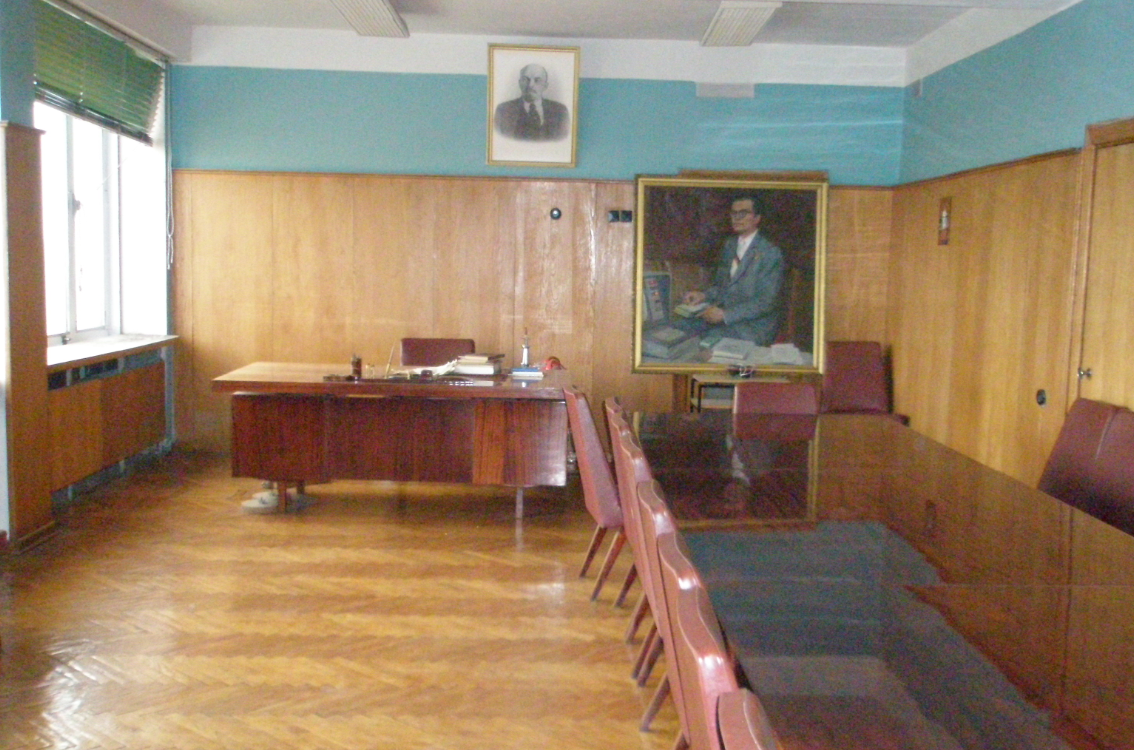
Memorial office of Viktor Glushkov at the Institute of Cybernetics
- Is there a workplace in this room?
- As it was, it remained so. There are also gifts stored in closets, documents. A lot of documents have not yet been sorted out, I just do not have enough time and there are no people for this. One IFIP alone, eight healthy folders in English. Conveniently, all directions were collected in one place. In Moscow and Leningrad, all such works were scattered across different institutions. But the Kiev Institute of Cybernetics was universal.
- There is a project in Novosibirsk dedicated to Academician Ershov. They digitized and posted the entire archive that has survived.
- We should at least digitize OGAS! There are 700 pages of the 1973 draft, 800 pages of the 1980. And that's the problem.

Vera Glushkova at the editorial office of the Fakty newspaper. Photo from Vera Viktorovna's Facebook page
Live Google
- Tell us about the material side of your family's life.
- My father was an absolute workaholic, he was far from material delights. If I brought anything from my trips, it was related to our spiritual development, for example, records or books. He himself was very fond of technical innovations - cameras, portable tape recorders.
- Why records?
- I then already studied at the institute and was fond of modern music. He asked what to bring, so I asked for the records. He did not understand them, so the French accompanying him advised what to buy. I remember then he brought Slade from France and Uriah Heep. Many people came to us to listen to them.
- What was your book library?
- The library was very large, both artistic and scientific. Everybody read science fiction then, we had a lot of it. At that time, an anthology of fiction was published, where many wonderful writers were collected - both ours and foreign ones: Ray Bradbury, Arthur Clarke, Stanislav Lem, Robert Sheckley, and others. About 30 volumes. The most interesting thing is that almost everything was taken out by someone. They took it to read, probably - and did not return it. I'm not offended: God forbid, that someone would find these books useful.
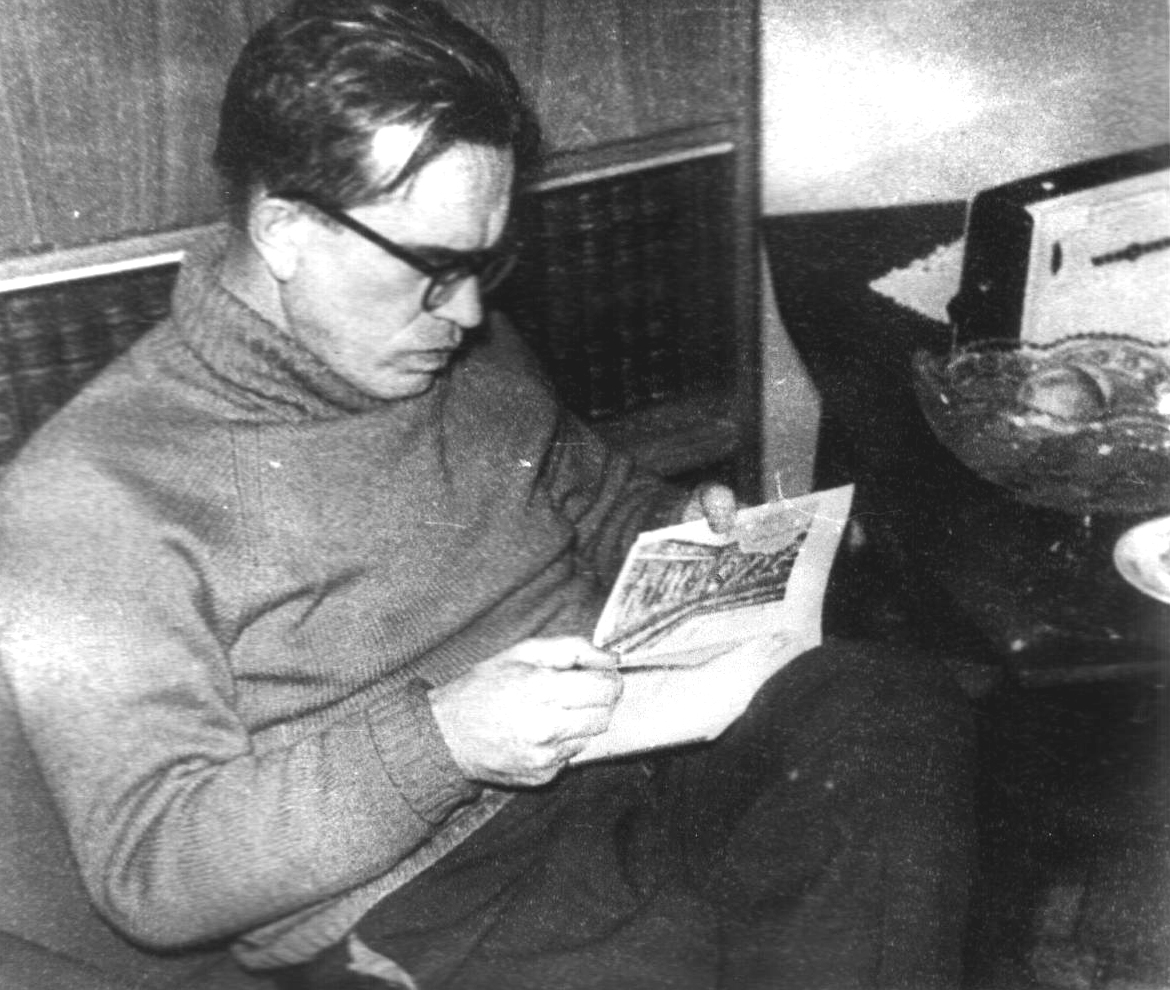
- Was your father fond of poetry?
- Yes, he loved poetry, he could recite for hours. I knew Vysotsky by heart. When we went to Bulgaria - he to work, and we to have a rest - read us humorous things by heart. About Fischer, about Kanatchikova's dacha, I read Faust in German, I loved Pushkin, Blok, Bryusov. He had a phenomenal memory. He said that in the 6th grade he read a book on hypnosis, he did not like it, but when he read it, he understood how to train memory. He himself invented the technique, memorized 20 pages of mathematical text. Sometimes we did crosswords. In "Science and Life" they were very complex, the names of some rivers and cities on the map cannot be found, but he knew everything. It's amazing, of course, a living Google.

On vacation with a corresponding member of the USSR Academy of Sciences Anatoly Stogniy
- you said that he loved hiking.
- Yes, for him it was the best vacation - to sail on a boat somewhere with his company. We pitched tents, and did not say where they would stand. Then there were no mobile phones, but if something had to be urgently signed, somehow they always found it.